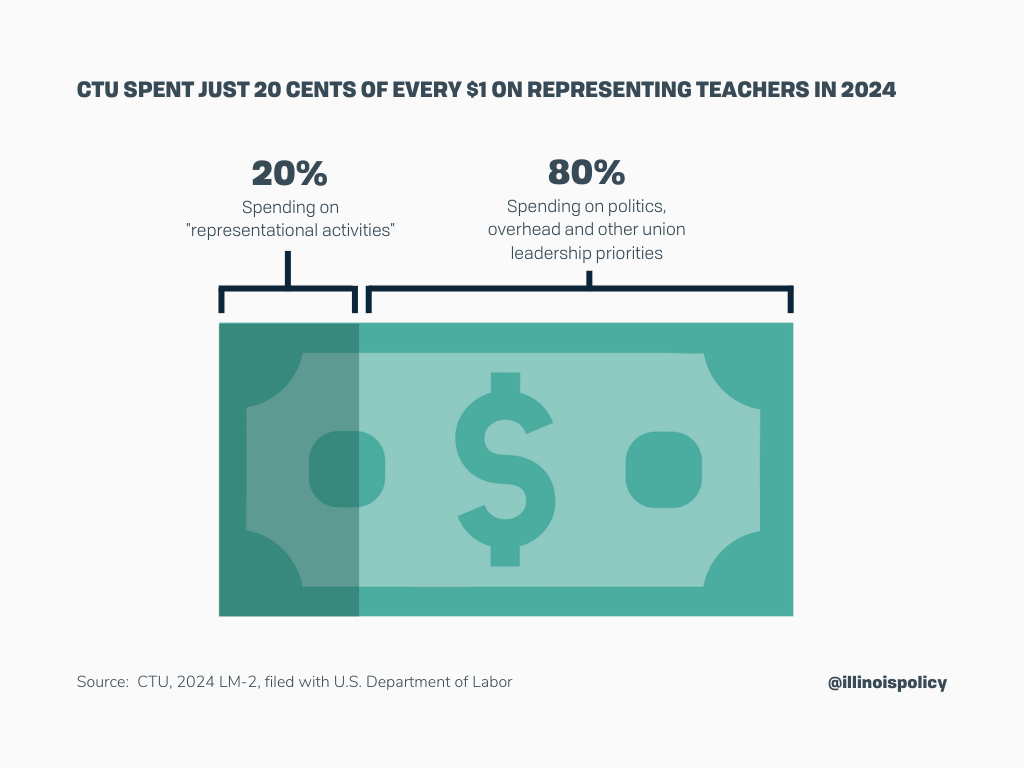Chicago Teachers Union continues to underfund member representation
Not even 20% of CTU’s spending went to representing its members during its 2023-2024 fiscal year, according to its own federal reporting.
The Chicago Teachers Union’s federal report on its 2023-2024 fiscal year showed it spent little on representing its own members compared to its leaders’ other priorities.
Each year, the union must file a report with the U.S. Department of Labor, detailing its receipts and spending during the previous fiscal year, which ended June 30.
Here are five things you should know about CTU’s reported spending in 2024 and what it means for Chicago teachers:
- Less than 20% of CTU’s spending was on representing members in 2024.
- Members who are full-time employees of Chicago Public Schools pay over $1,400 in dues, but less than $149 of that was devoted to representing Chicago teachers.
- CTU spent more than $2 million on politics in 2024.
- Stacy Davis Gates gave herself a $12,000 raise.
- CTU members have other options.
Less than 20% of CTU’s spending was on representing workers in 2024
Representing members is supposed to be a union’s core purpose, but just 19.76% of the Chicago Teachers Union’s spending in 2024 was on “representational activities.” The rest was spent on administration, politics and other union leadership priorities.

Specifically, CTU reported spending a total of $32,918,826 in 2024. Of that, just $6,505,262 was on “representational activities,” which the Department of Labor defines as those activities “associated with preparation for, and participation in, the negotiation of collective bargaining agreements and the administration and enforcement of the agreements.”
To put this in perspective, the Wise Giving Alliance, a project of the Better Business Bureau, maintains at least 65% of a nonprofit’s total expenses should be on program activities. CTU’s spending on members was up from the mere 17% it spent in 2023, but it still falls far short of this mark.
While the Wise Giving Alliance tracks spending by traditional charities, it stands to reason CTU’s spending of less than 20% on representation – the purpose of a union – should be a cause for concern among members.
2. Members pay over $1,400 in dues, but less than $149 is spent on representing Chicago teachers
CTU members who are full-time employees at CPS pay at least $1,410.98 in dues each year.
Only $749.58 of that amount comprises “base dues,” which stay with CTU. The rest is passed up the chain to Illinois Federation of Teachers, the American Federation of Teachers or other union entities.
That means less than $149 – or 19.76% of the $749.58 that stays local – of each member’s annual dues is spent on representing Chicago teachers.
Neither IFT nor AFT prioritize representing members, either. In 2023, just 28% of IFT’s spending was on representation, according to its LM-2. AFT didn’t do any better, with just 27% of its spending on representing teachers. Those entities have not yet filed their LM-2s for 2024.
3. CTU spent over $2 million on politics
CTU spent over $2 million on “political activities and lobbying” between July 1, 2023, and June 30, 2024. The largest recipient was its own political action committee, which received over $644,000.
Other spending included $208,000 to former Cook County Commissioner Larry Suffredin for “political consulting,” $100,000 to Our Schools Action for CTU’s preferred school board candidates and $7,600 to Limousine Services.
While its political spending was down compared to the previous fiscal year (which included its 2023 election spending), it was still more than double most previous years reported.
The current federal report doesn’t include any of CTU’s giving in the lead up to the 2024 election, such as the more than $175,000 it has already spent on promoting Chicago school board candidates. That political spending won’t be reported by CTU until fall 2025.
What’s more, CTU spent an additional $127,726 on “contributions, gifts, and grants.” While the U.S. Department of Labor gives examples of such disbursements as “charitable contributions, contributions to scholarship funds, etc.,” these expenditures can often be political in nature. For example, one recipient of such funds from CTU was In These Times, which bills itself as “providing the public attention and intellectual fuel that progressives need to leverage, build and wield power.”
CTU’s spending on “contributions” in 2024 was nearly quadruple its spending in the previous fiscal year. Notably, only $84,216 was itemized by recipient, meaning members can have no idea who the recipients were for the other $95,000.
4. Stacy Davis Gates gave herself a $12,000 raise
Stacy Davis Gates earned $187,530 in her role as CTU president in 2024 – an increase of nearly $12,000 from the $175,878 she was paid the year before.
This is in addition to her compensation in other roles, such as executive vice president of the Illinois Federation of Teachers, where she earned an additional $77,444 as reported in IFT’s 2023 report.
In total, more than 50 CTU employers made $100,000 or more in the 2023-2024 fiscal year.
5. CTU members have other options
Chicago educators who want more control over their dues have options:
- Teachers can get liability insurance and legal protection elsewhere. Educators can join other associations, such as the Association of American Educators. AAE, which has more than 30,000 members across the country and provides liability insurance and legal protection to public school employees – at a fraction of the cost of union membership.
- Teachers can opt out of union membership and keep all employer-provided benefits. By opting out of union membership, a teacher stops paying dues to the union yet retains all benefits that are provided in the collective bargaining agreement with the school district.
Unfortunately, CTU only provides an annual window of time in which members can opt out and cease paying dues. That window is in August of each year, but teachers interested in opting out can visit LeaveCTU.com for more information and to sign up for a reminder to opt out when August 2025 approaches.
